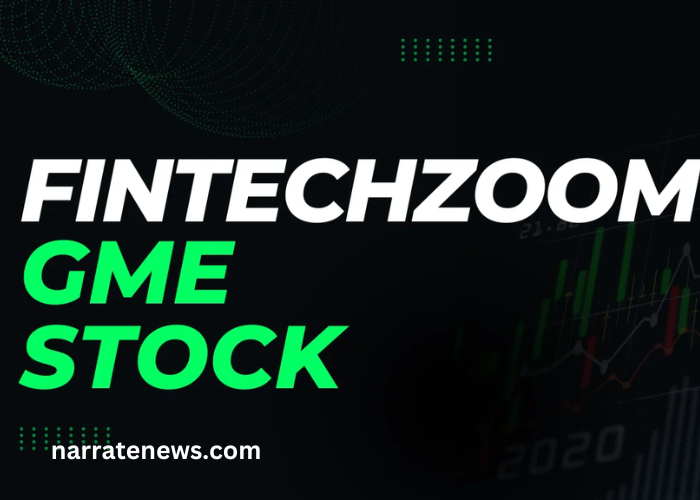
GME Stock Fintechzoom
The stock market is often full of surprises, but few events have captivated the public and financial experts alike as the meteoric rise and subsequent volatility of GameStop (GME) stock. Initially a struggling brick-and-mortar video game retailer, GameStop’s stock became the center of a historic trading frenzy driven by retail investors on social media platforms. FintechZoom, a leading financial news and analysis site, has provided extensive coverage of this phenomenon, offering insights into the implications for investors, market dynamics, and regulatory considerations. This article delves into the saga of GME stock through the lens of FintechZoom, examining its rise, the key players involved, and the broader impact on the financial markets.
The Rise of GME Stock
Early Struggles and Short Interest
Before its dramatic rise, GameStop was facing significant challenges. The company struggled with declining sales, outdated business models, and increasing competition from digital game distribution platforms. This led to a high short interest, where investors bet against the stock, believing its price would fall further. By late 2020, over 100% of GameStop’s available shares were shorted, making it one of the most shorted stocks on the market.
The Reddit Revolution
The narrative took a sharp turn when retail investors on the subreddit r/WallStreetBets identified the potential for a short squeeze—a situation where those shorting the stock are forced to buy shares to cover their positions, driving the price up rapidly. Led by influential users like Keith Gill (known as “DeepF***ingValue”), these investors began purchasing GME shares en masse. FintechZoom highlighted how this grassroots movement leveraged social media to coordinate their actions, leading to an unprecedented surge in GME’s stock price.
The Peak and Subsequent Volatility
In January 2021, GME stock skyrocketed from under $20 to an all-time high of $483 per share. This meteoric rise generated significant media attention and sparked a broader debate about market dynamics and the role of retail investors. FintechZoom’s coverage emphasized the volatility and risks associated with such rapid price movements. The stock’s price fluctuated wildly, resulting in massive gains and losses for different groups of investors.
Key Players and Influences
Retail Investors
The retail investors from r/WallStreetBets played a crucial role in the GME saga. Their collective buying power and ability to mobilize quickly through social media platforms demonstrated a new form of market influence. FintechZoom detailed how these investors, many of whom were driven by a desire to challenge traditional financial institutions, used a combination of call options and direct share purchases to fuel the rally.
Institutional Investors and Hedge Funds
Hedge funds and institutional investors, who had heavily shorted GME stock, found themselves in a precarious position. Firms like Melvin Capital suffered substantial losses as the stock price soared. FintechZoom explored how these institutional players were forced to adapt their strategies and manage the fallout from the short squeeze. The situation also led to increased scrutiny of short-selling practices and hedge fund activities.
Regulatory and Market Response
The rapid rise and volatility of GME stock prompted responses from regulators and market participants. FintechZoom covered the actions taken by trading platforms like Robinhood, which restricted trading of GME and other heavily shorted stocks, citing the need to manage risk and comply with regulatory requirements. These restrictions sparked outrage among retail investors and led to congressional hearings on market fairness and the role of trading platforms.
Broader Implications for the Financial Markets
Market Dynamics and Retail Investor Influence
The GME phenomenon highlighted the growing influence of retail investors in the stock market. FintechZoom analyzed how this shift could lead to more frequent instances of market volatility driven by social media trends and collective action. The traditional power dynamics in financial markets, where institutional investors and hedge funds dominated, were challenged by the coordinated efforts of retail investors.
Technological and Regulatory Considerations
The events surrounding GME stock also underscored the need for technological and regulatory updates. FintechZoom discussed the potential for enhanced transparency and disclosure requirements, particularly concerning short-selling activities. Additionally, the role of algorithmic trading and the impact of trading restrictions were examined, suggesting that regulators might need to adapt their frameworks to better address the complexities of modern financial markets.
The Role of Fintech Platforms
Fintech platforms like Robinhood played a central role in the GME saga, providing retail investors with easy access to the stock market. However, their actions during the height of the trading frenzy drew significant criticism. FintechZoom’s analysis highlighted the need for these platforms to balance accessibility with robust risk management and regulatory compliance. The events also sparked discussions about the democratization of finance and the responsibilities of fintech companies in maintaining market integrity.
Lessons Learned and Future Outlook
Investor Education and Risk Management
One of the key takeaways from the GME saga is the importance of investor education and risk management. FintechZoom emphasized that while the ability of retail investors to influence market dynamics is significant, it also comes with risks. Educating investors about the potential dangers of speculative trading and the importance of diversified portfolios is crucial to fostering a healthy market environment.
Evolution of Market Strategies
The experience of GME has likely prompted both retail and institutional investors to reevaluate their market strategies. FintechZoom suggested that institutional investors might develop more sophisticated risk management techniques to guard against similar short squeezes in the future. Meanwhile, retail investors may become more organized and strategic in their collective actions, potentially leading to more sophisticated market maneuvers.
Regulatory Developments
The regulatory landscape is expected to evolve in response to the lessons learned from the GME episode. FintechZoom predicted increased scrutiny of trading platforms and short-selling practices, as well as potential updates to market infrastructure to enhance stability and transparency. Regulators may also focus on the influence of social media on trading behaviors, considering measures to address potential market manipulation.
Conclusion
The story of GME stock is a landmark event in the history of financial markets, showcasing the power of retail investors and the impact of social media on stock trading. Through its comprehensive coverage, FintechZoom has provided valuable insights into the various facets of this phenomenon, from the initial surge driven by r/WallStreetBets to the broader implications for market dynamics, regulatory considerations, and the future of fintech platforms.
As the financial world continues to grapple with the aftermath of the GME saga, it is clear that the lessons learned will shape the future of investing. The democratization of finance, the evolving role of retail investors, and the need for updated regulatory frameworks are all critical areas of focus. FintechZoom’s analysis underscores the importance of understanding these dynamics to navigate the complex and ever-changing landscape of the stock market.
In conclusion, GME stock’s journey from a struggling retailer to the epicenter of a trading revolution is a testament to the transformative power of collective action and technological innovation. As investors, regulators, and market participants reflect on this historic event, the insights provided by platforms like FintechZoom will be instrumental in shaping a more inclusive, transparent, and resilient financial system.


